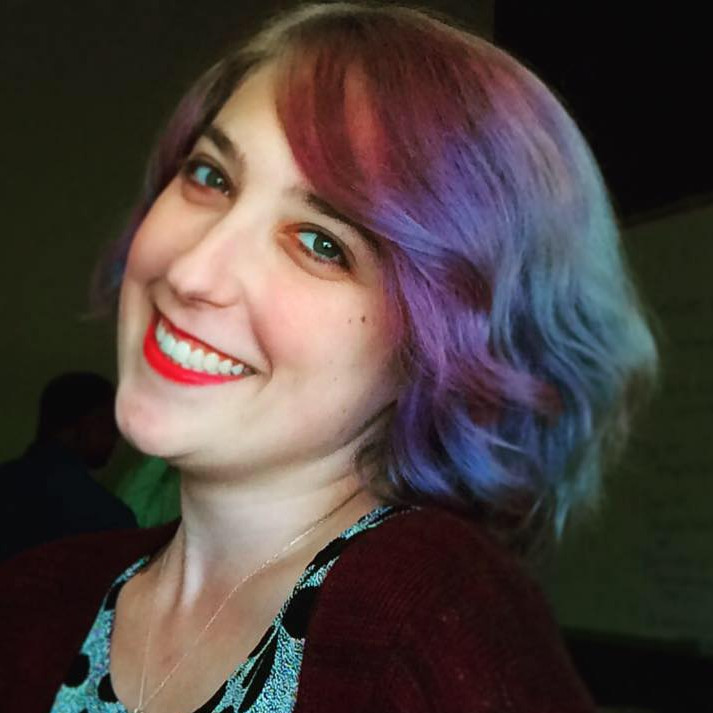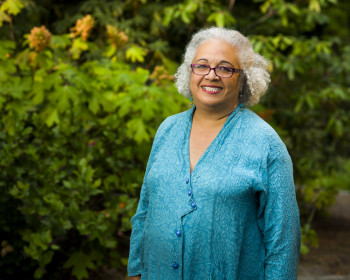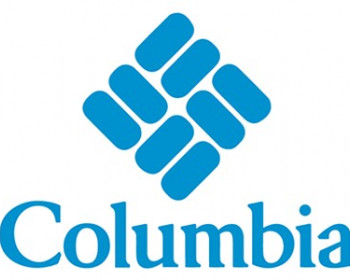Q&A with Gender-Based Violence Prevention Coordinator Ariella Frishberg
Open gallery

In 2018, Lewis & Clark received a grant from the Department of Justice’s Office on Violence Against Women to improve our prevention of and response to sexual and interpersonal violence on campus. Ariella Frishberg was hired in February 2019 as the project coordinator and facilitates the Interpersonal Violence Prevention Team. This team includes representatives from across the institution and community including administrative staff and faculty from all three campuses, as well as community partners.
The following Q&A with Ariella highlights the significance of her role and offers upcoming opportunities for community involvement:
Tell us about your job and what you hope to accomplish at Lewis & Clark.
Ultimately, my job is about helping shift culture on the LC campus to make this a place where violence isn’t tolerated. Of course, cultural change is not actually a one-person job, so my role is all about getting people involved in and excited about that shift.
My position coordinates the many different pieces of the OVW grant we received in 2018. When I first arrived on campus I looked at all the ways we respond to sexual and interpersonal violence on campus and all the ways we work on preventing violence from happening in the first place. What I found is that we have a lot of great pieces already in place, but they aren’t operating in connection with each other and/or people (students/staff/faculty) don’t know about them.
I’ve focused my position in two ways:
- Coordinating our response to violence so that each office works well in connection with others and making sure all pieces of that process are survivor-centered and trauma-informed, and
- Creating prevention-focused curricula for all members of the LC community to learn more about their role in creating a safer campus.
What support services does Lewis & Clark currently offer for survivors of interpersonal violence and how does your work inform those services?
There are many ways for survivors of sexual or interpersonal violence (sexual assault, dating violence, stalking, and harassment) to access resources at Lewis & Clark. Confidential resources include the SARAs (Sexual Assault Response Advocates), Spiritual Life, the Ombuds Office, Health Promotion and Wellness, Health Service, and the Counseling Service. Each of those roles can support survivors in navigating and understanding their options and other resources available to them. This may include housing changes, academic accommodations, and ongoing emotional support, among other things.
Survivors can also choose to disclose in a way that begins a formal disciplinary process. One would do this by talking to any faculty/staff member who isn’t one of the confidential resources listed above. The person you disclose to can help you fill out a Title IX Report. Survivors are also able to fill out that form themselves. Once a Title IX Report has been filed, a more formal disciplinary process can begin, which ultimately can lead to consequences for the alleged perpetrator.
This process can be confusing, and a big part of my job right now is working on making it more transparent and accessible for students, faculty, and staff. One of my biggest priorities is making sure survivors aren’t afraid to ask for the help they need, and that they understand how many resources are here to support them.
How is your role different from the Lewis & Clark’s Title IX coordinators?
Good question – my role is super different! Title IX is a federal law that prohibits discrimination in education. Part of Title IX mandates what processes we are required to implement on our campus in response to sexual or interpersonal violence. The Title IX Coordinators are individuals on campus who are part of the disciplinary process when someone violates our Sexual Misconduct Policy.
My job is more holistic – taking both response to and prevention of violence into account. I am working with the Title IX Team to make sure they are following best practices, but I’m also working with Health Promotion and Wellness to build curriculum for prevention workshops on all three campuses. I’m also working with staff and faculty to help them understand what their responsibilities are when it comes to disclosures and how to make classrooms or offices more trauma-informed. And I’m working with the administration to revise our policies and procedures at the institutional level. And I’m hoping to work with students this term to make sure student voices are included at every level of this work!
How did you get involved in this kind of work?
I first got involved in high school when two different friends were sexually assaulted and I was the first person they each told. In trying to support them, I realized how messed up it is that we generally aren’t taught about interpersonal violence until after it happens to us. After experiencing an abusive relationship in college I became even more committed to doing prevention work. I majored in Women and Gender Studies in undergrad and for my thesis created lesson plans that could be implemented in high school classrooms on these topics. Post-graduation I worked at YWCA Clark County in their domestic violence and sexual assault programs, first doing advocacy and crisis work, and then doing prevention education in the local high schools, where I actually got to use some of the lesson plans I’d created in college!
What is bystander intervention?
Bystander intervention is an approach to violence prevention that recognizes that the majority of people are not going to be perpetrators or targets of violence. However, all of us will, at some point or another, have the opportunity to intervene in a red-flag situation and help stop violence from happening. Our Lead the Change bystander intervention workshops will give people the skills to recognize when they are seeing precursors to violence and intervene in a way that is safe for them and the potential victim. Leading these workshops is one of my favorite parts of my role!
What can members of the LC community do to get involved with the work you’re doing to foster a safer learning environment on campus?
It really is on all of us to create the culture we want here. Ultimately, violence happens because we let it happen – whether it’s because we passively turn away, because we accept rape culture as the status quo, or because we are paralyzed and don’t know what to do when we see something harmful happening. The Lead the Change workshops are one part of the toolkit for creating a culture on campus that doesn’t tolerate violence in any form – whether that’s dating violence, sexual assault, harassment, or microaggressions. I envision a campus where all students are able to focus completely on their education because the threat of violence isn’t a part of their experience here. It will take every member of the LC community to make that a reality.
How to get involved:
For students (CAS, GRAD, and LAW):
- If you’d like to be involved with policy/procedure revision, peer education, and prevention efforts you can become an IVPT Student Consultant (contact me to learn more about this professional development opportunity!).
- Schedule a Lead the Change: Bystander Intervention training for your student organization, dorm, or athletic team.
For faculty/staff:
- Attend a Lead the Change: Bystander Intervention workshop to learn skills for intervention - attendance highly encouraged for all employees of LC
- Attend a Dynamics of Violence training to learn more about how power and control impact our students’ lives – attendance highly encouraged for anyone who works directly with students
- Schedule a time to chat with me about making your classroom/office/department more trauma-informed. Write to: afrishberg@lclark.edu.
Sign up for Violence Prevention Trainings
This project is supported by Grant No. 2018-WA-AX-0042, awarded by the Office on Violence Against Women, U.S. Department of Justice. Points of view in this document are those of the authors and do not necessarily represent the official position or policies of the U.S. Department of Justice.
More The Source Stories
email source@lclark.edu

